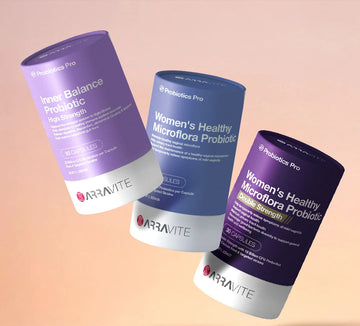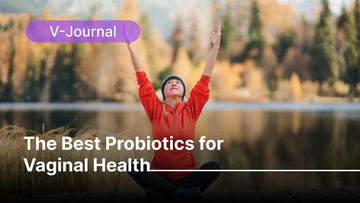For your overall health, it is essential to maintain good vaginal health. An effective way to do this is to use vaginal probiotics that keep your vaginal microbiome in check. This balance in the microbiome may help protect against infections like bacterial vaginosis (BV) and yeast infections. Research has demonstrated that supplementation with probiotics — especially those containing Lactobacillus strains — can help restore and maintain vaginal balance. (Source: Science Direct)
What Exactly Are Vaginal Probiotics?
Your vagina has its delicate ecosystem called the vaginal microbiome. Naturally, it contains many different types of bacteria, with the good ones — mostly Lactobacillus species — serving as leading players. These positive bacteria help to maintain a low pH (an acidic environment in the vagina), which inhibits the growth of less desirable types of bacteria and yeasts that can lead to discomfort or infections such as Bacterial Vaginosis (BV) or thrush (vulvovaginal candidiasis).
If this natural balance is disturbed, you may experience whitish discharge, odour, itching, irritation, etc. Vaginal probiotics are supplements made of specific strains of live bacteria — almost always Lactobacillus — that are taken orally or sometimes applied vaginally to help support or restore this healthy balance.
How to Choose the Right Probiotics?
With so many different supplements on the shelves here in Australia, it can be overwhelming to choose the right one. How do you know which is the right one for you? Some of the things to look for are:
Specific Strains
Probiotics are not all equal. Search for clinically researched strains of probiotics that may promote vaginal health, such as Lactobacillus rhamnosus (especially GR-1), Lactobacillus reuteri (especially RC-14), Lactobacillus crispatus, Lactobacillus gasseri and Lactobacillus jensenii. These are among the dominant species present in a healthy vaginal microbiome.
CFU Count
CFU, Colony Forming Units, indicate the number of live bacteria per dose. Higher isn’t automatically better, but you want to see enough CFU, typically between 1 billion and 50 billion, depending on the specific strains and overall product formulation.
Formulation & Stability
Do you prefer oral capsules or molasses for a vaginal pessary (oral supplements are more common)? See if the product needs to be refrigerated or is shelf-stable for more convenient use. Also, consider brands offering well-researched probiotics, such as those from Arravite.
The Best Probiotics for Vaginal Health
Though probiotics are usually the healthy microorganisms that benefit you, vaginal probiotics are specific strains. These probiotic strains are critical in maintaining a healthy vagina and avoiding vaginal infections and STDs. Most of these are consumable, i.e., you can swallow them, and they still work:
1.Lactobacillus rhamnosus GR-1®
Lactobacillus rhamnosus GR-1® is unique in its well-established ability to adhere to the cells of the vaginal wall and thus act as a physical barrier to pathogen adhesion. (Source: The Nature Scientific Report) Its production of lactic acid plays a key role in maintaining the vagina’s naturally low pH level, an environment that is biologically antagonistic to many pathogenic bacteria and yeasts. Additionally, this strain has a bioactive component that inhibits the colonisation and proliferation of such harmful microbes.
2.Lactobacillus reuteri RC-14®
There’s a tough-as-nails strain, Lactobacillus reuteri RC-14®, that seems to be able to withstand the entire digestive journey and colonise the vaginal tract from the mouth. (Source: PubMed) Once it is well established, it will secrete specific antimicrobial substances that directly inhibit the growth of many pathogens associated with vaginal discomfort. Additionally, RC-14® effectively competes for attachment sites on the vaginal epithelium, which limits available space for pathogenic microbes.
3.Lactobacillus crispatus
Lactobacillus crispatus is considered as of an optimally healthy vaginal microbiome. It is the most dominant species when vaginal health is at its best. (Source: PubMed) It is a potent lactic acid producer which helps to create the low pH environment that is the vagina’s first line of natural defence. L. crispatus sticks tightly to vaginal cells, impeding pathogens from attaching and beginning infection.
4.Lactobacillus gasseri
An abundant and advantageous inhabitant of the healthy vagina, Lactobacillus gasseri significantly contributes to the overall ecological balance. Like the other main Lactobacilli, it adds considerably to the protective acidity of the vagina via secretion of lactic acid. Certain strains of L. gasseri also produce bacteriocins (natural antimicrobial compounds) that selectively inhibit some vaginal pathogens. It allows for the dominance of the beneficial Lactobacilli, thus helping to keep our vagina naturally resistant to infection and discomfort.
5.Lactobacillus jensenii
Lactobacillus jensenii is the other species commonly found in the microbiome profiles of women with usually good vaginal health, underscoring the role of balance. Collectively, these characteristics enable it to continuously secrete lactic acid, which co-creates a low pH environment required for protection of the vagina. Moreover, L. jensenii effectively competes with possible pathogens for essential nutrients and physical sites on the vaginal surface, making it difficult for harmful microbes to grow.
6.Lactobacillus acidophilus
While they’re best known for their gut health benefits, certain strains of Lactobacillus acidophilus are natural inhabitants of the vagina and play a crucial role in vaginal health. They enhance the acidic milieu via consistent lactic acid production, augmenting this significant defence barrier. By attaching so firmly to the vaginal epithelial cells, L. acidophilus prevents the binding of pathogenic bacteria and yeast. Some strains also produce unique antimicrobials, such as acidolin, which inhibits competing microbes’ growth.
7.Lactobacillus fermentum
Family Strains (like Lactobacillus fermentum species) – Some strains of the lactobacillus fermentum species have unique benefits for vaginal health, including the ability to produce hydrogen peroxide. Then, some features that serve as an antimicrobial compound contribute to the inactivation of many pathogens sensitive to oxidative stress. Additionally, L. fermentum assists in the production of lactic acid, which further improves the protection of the vagina through its acidity and possesses the ability to colonise the vaginal mucosal surface successfully.
8.Lactobacillus plantarum
Lactobacillus plantarum strains have noted high adherence to the vaginal lining, which is key for colonisation and persistence. This salting-up allows for effective competition vs pathogens for space and resources within the vaginal niche. Similar to its relatives, L. plantarum helps maintain a low pH ( pH ~ 4) within the vagina by producing lactic acid and is one of the primary species regulating pH levels.
9.Lactobacillus paracasei
Strains such as Lactobacillus paracasei F-19® provide essential diversity to the Lactobacillus population in vaginal flora, promoting a healthy and more competitive environment. It contributes to the lactic acid pool that helps maintain essential protective acidity. This strain also fights potential pathogens for real estate, blocking their access to sites on the vaginal walls, where they can settle and proliferate. Its presence aids the general balance and functional health of the entire vagina.
10.Lactobacillus rhamnosus HN001
Lactobacillus rhamnosusHN001 is also known for its systemic immune benefits, but its role in the vaginal environment as a Lactobacillus is likely limited to the benefits of its very nature. It helps retain the critical low pH via lactic acid production — one of the pillars of vaginal protection. The strain clings to vaginal surfaces, enabling it to monopolise precious real estate and essential resources, reducing the opportunity for less desirable bacteria and yeast to thrive.
ARRAVITE – Bringing the Best Probiotics Together
Taking proactive steps to understand and nurture your vaginal microbiome is a helpful step in managing your overall comfort. ARRAVITE’s Healthy Microflora Probiotic is a dietary supplement that incorporates the most essential probiotics for vaginal health. Packed in an easy-to-consume capsule, adding this supplement to your diet offers complete freedom.
The supplement contains six essential probiotic strains that support the healthy vaginal microflora growth. The best part is you can take the supplement even with antibiotics. Consult your medical professional if you observe an unknown symptom or discomfort.
References:
Ling-Ying Wu, Tsai-Hwa Yang, Yu-Che Ou, Hao Lin, The role of probiotics in women’s health: An update narrative review, Taiwanese Journal of Obstetrics and Gynecology, Volume 63, Issue 1, 2024, Pages 29-36, ISSN 1028-4559, https://doi.org/10.1016/j.tjog.2023.09.018.https://doi.org/10.1016/j.tjog.2023.09.018.
Mu Q, Tavella VJ, Luo XM. Role of Lactobacillus reuteri in Human Health and Diseases. Front Microbiol. 2018 Apr 19;9:757. doi: 10.3389/fmicb.2018.00757. PMID: 29725324; PMCID: PMC5917019.
Lewis FMT, Bernstein KT, Aral SO. Vaginal Microbiome and Its Relationship to Behavior, Sexual Health, and Sexually Transmitted Diseases. Obstet Gynecol. 2017 Apr;129(4):643-654. doi: 10.1097/AOG.0000000000001932. PMID: 28277350; PMCID: PMC6743080.
Petrova, M., Lievens, E., Verhoeven, T. et al. The lectin-like protein 1 in Lactobacillus rhamnosus GR-1 mediates tissue-specific adherence to vaginal epithelium and inhibits urogenital pathogens. Sci Rep 6, 37437 (2016). https://doi.org/10.1038/srep37437





